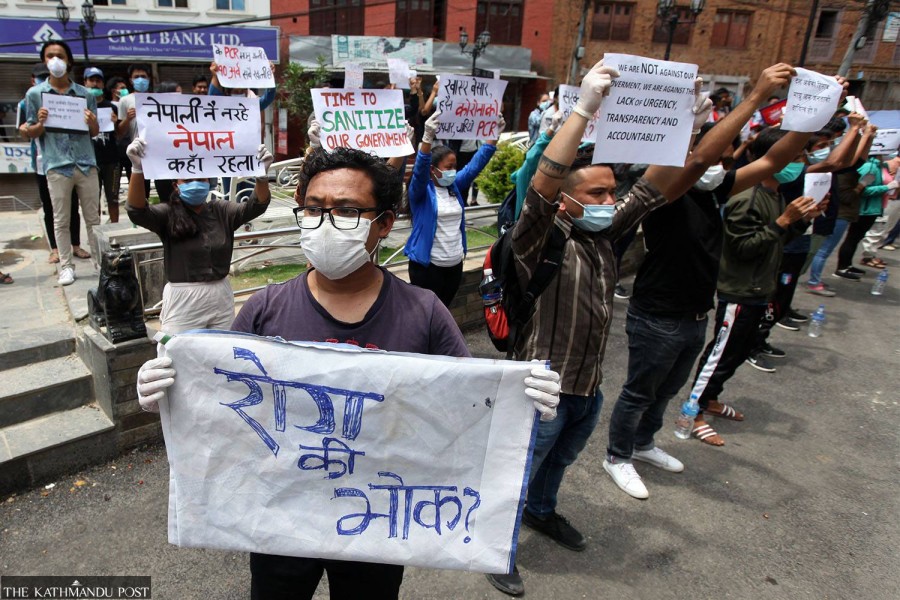National
Nepal failed to prevent Covid deaths, address rights challenges, says Human Rights Watch
In its global report, the New York-based international human rights organisation says transitional justice remains as slow as ever.
Post Report
Nepal government’s failure to prepare and respond effectively when the Covid-19 pandemic surged led to many preventable deaths and several serious rights challenges in the country remained unaddressed, Human Rights Watch says in its global report.
The New York-based international human rights organisation said the Nepal government failed to provide adequate and equal health care during the pandemic in 2021.
Issuing its annual global report summing up the human rights situation in different countries in the world, the rights body said serious rights challenges in Nepal remained unaddressed for months in 2021 due to the political infighting.
The government was largely paralysed by a struggle over the post of prime minister and repeated dissolutions of parliament, according to the report. The erstwhile KP Sharma Oli government had dissolved the House of Representatives twice—on December 20, 2020 and May 21 last year.
Over 9,000 Covid-19 related deaths were reported last year mainly in the second wave that gripped the country in April.
The report has pointed out that patients lost their lives for the lack of bottled oxygen while the government failed to prepare for the scale of the outbreak.
“The situation was made worse by a shortage of vaccines reflecting both global scarcities—wealthy governments blocked an intellectual property waiver that would have allowed for increased international production of vaccines and failed to require more widespread technology transfers—and delays in procurement by the government amid allegations of corruption,” reads the report.
Attempts by the erstwhile government to buy 5 million doses of vaccines from the Serum Institute India were marred in controversy of corruption leading to its failure.
The report says a pervasive culture of impunity continues to undermine fundamental human rights in Nepal. Ongoing human rights violations by the police and army, including cases of alleged extrajudicial killings and custodial deaths resulting from torture, are rarely investigated, and when they are, alleged perpetrators are almost never arrested, according to the report.
The report blames both the Oli and incumbent Sher Bahadur Deuba governments for blocking justice in conflict-era cases of human rights violation.
The terms of two transitional justice commissions were extended again last year, though neither has made progress since being established in 2015 to provide truth to victims, establish the fate of the victims of enforced disappearances and promote accountability and reconciliation, the report said.
“Impunity for human rights abuses extends to ongoing violations, undermining the principles of accountability and rule of law in post-conflict Nepal,” the report says.
The report has also pointed out the serious situation of child marriage and discriminatory legal and constitutional provisions for citizenship in Nepal.
Nepal has one of the highest rates of child marriage in Asia, with 33 percent of girls marrying before 18 years and 8 percent married by age 15 while nine percent boys marry before the age of 18, according to the report. It says the situation worsened during the pandemic, as children were pushed out of education and families faced increased poverty.
“Nepal’s 2006 Citizenship Act, as well as the 2015 constitution, contain provisions that discriminate against women,” reads the report. “Due to flawed citizenship laws, an estimated 5 million people are forced to live without citizenship and are at risk of statelessness.”
An amendment bill on the Citizenship Act is pending in parliament as it continues to carry the discriminatory provisions.
The report says the amendment bill also contains a clause that would require transgender people to provide “proof” of their transition to access citizenship documents according to their gender identity—which violates international human rights law and a 2007 Nepal Supreme Court judgment mandating that gender identity be recognized based on “self-feeling.”
The annual global report has also raised the issue about caste-based discrimination in Nepal.
“Caste-based violence and discrimination against Dalits are rarely investigated or prosecuted, despite the adoption of the Caste-based Discrimination and Untouchability (Crime and Punishment) Act in 2011,” says the report.




 10.12°C Kathmandu
10.12°C Kathmandu














